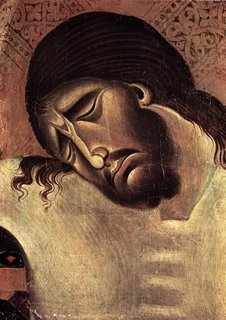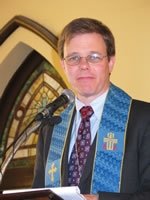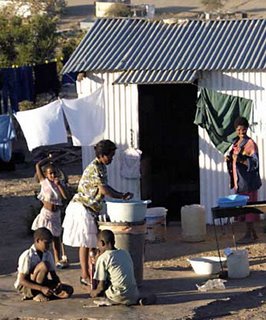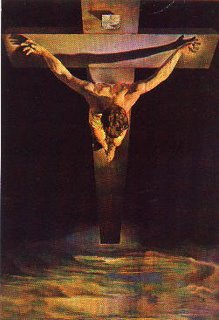 Today, Good Friday, I read a sermon by Rick Ufford-Chase, the elder who is serving as Moderator of our Presbyterian Church (U.S.A.) General Assembly. He preached it to a standing-room-only crowd at First Presbyterian Church, Havana, on April 2nd and posted it on his blog on April 11th. Shannan, a colleague from Monmouth Presbytery, e-mailed it to a number of us who are active in the Presbytery’s mission partnership with the Presbyterian and Reformed Church of Cuba. (You can read more about Rick's visit to Cuba by clicking on this link.)
Today, Good Friday, I read a sermon by Rick Ufford-Chase, the elder who is serving as Moderator of our Presbyterian Church (U.S.A.) General Assembly. He preached it to a standing-room-only crowd at First Presbyterian Church, Havana, on April 2nd and posted it on his blog on April 11th. Shannan, a colleague from Monmouth Presbytery, e-mailed it to a number of us who are active in the Presbytery’s mission partnership with the Presbyterian and Reformed Church of Cuba. (You can read more about Rick's visit to Cuba by clicking on this link.)Rick is fluent in Spanish. Before his election as Moderator, he was active in Central American mission work. One thing he said in his sermon really struck me, about the contrast between how we celebrate Lent and Easter here in the U.S.A. and how they do it in Guatemala.
Rick lived in Guatemala for a time while he was learning Spanish, and noticed that the observance of Lent is generally a much bigger deal in Central America than it is here. The focus of it all is Good Friday – which is, for the Guatemalans, a highly emotional service.
Several days later, Rick showed up for an Easter mass in a Roman Catholic cathedral, and here’s what he experienced:
 “I supposed that that after all of the focus on the betrayal, trial, and crucifixion, that the service marking the resurrection on Easter Sunday morning would be significant, indeed. However, when I attended Mass at the large Cathedral on the square in Antigua that Sunday morning, I was surprised to find a service that felt fairly typical, with little celebration of the resurrection of Jesus. It made me realize that for Catholic Guatemalans, Lent was all about the pain and suffering of the crucifixion, with little or no emphasis on the empty tomb. Perhaps their focus grows out of their experience of five hundred years of conquest and close to forty years of a bloody civil war in their country.
“I supposed that that after all of the focus on the betrayal, trial, and crucifixion, that the service marking the resurrection on Easter Sunday morning would be significant, indeed. However, when I attended Mass at the large Cathedral on the square in Antigua that Sunday morning, I was surprised to find a service that felt fairly typical, with little celebration of the resurrection of Jesus. It made me realize that for Catholic Guatemalans, Lent was all about the pain and suffering of the crucifixion, with little or no emphasis on the empty tomb. Perhaps their focus grows out of their experience of five hundred years of conquest and close to forty years of a bloody civil war in their country. This is a dramatic contrast to my own experience of Lent. In the church of comfort and privilege in which I grew up, there was little or no emphasis on the crucifixion, by Easter Sunday morning was a marvelous celebration! For us, Lent was primarily about the empty tomb and the resurrection, with little or no focus on the suffering experienced by Jesus in his crucifixion.”
This is a dramatic contrast to my own experience of Lent. In the church of comfort and privilege in which I grew up, there was little or no emphasis on the crucifixion, by Easter Sunday morning was a marvelous celebration! For us, Lent was primarily about the empty tomb and the resurrection, with little or no focus on the suffering experienced by Jesus in his crucifixion.”I have lived most of my life, and currently serve, a “church of comfort and privilege” such as Rick describes. Few of us middle-class or upper-middle-class Americans think we’re wealthy or privileged – but, compared to the way most people in this world live, we are. And, true to Rick’s observation, we have a much harder time getting worshipers out to Lent and Holy Week services than we do on Easter.
Attendance on Maundy Thursday and Good Friday, in particular, has been diminishing for years. I can only conclude that the message of the cross is something most people in this culture are getting increasingly uncomfortable hearing. We fill every pew at our two services on Easter, and have to schedule an 8:00 a.m. service to accommodate the overflow. Palm Sunday’s a pretty big deal, too. But Maundy Thursday and Good Friday? Only the hard-core faithful come out to those special services.
 I think it’s all part of our culture’s denial of suffering. Middle- and upper-middle-class Americans live comfortable lives, for the most part. We all have our worries, but they don’t have to do with whether or not we’ll have food to eat tomorrow, or whether the corrugated-metal roof of our shantytown dwelling will blow away in the next big storm. Tales of suffering – whether of our neighbors south of the border, or of Jesus on the cross – are something most of us would rather not hear about, thank you.
I think it’s all part of our culture’s denial of suffering. Middle- and upper-middle-class Americans live comfortable lives, for the most part. We all have our worries, but they don’t have to do with whether or not we’ll have food to eat tomorrow, or whether the corrugated-metal roof of our shantytown dwelling will blow away in the next big storm. Tales of suffering – whether of our neighbors south of the border, or of Jesus on the cross – are something most of us would rather not hear about, thank you.Yet such tales are a part of life, even here. They can become a part of our lives, when there’s a sudden economic reversal, or when a disease like cancer hits us or people we love. If we have no experience reflecting on suffering’s meaning before misfortune happens, it can come as an awful blow.
I would very much have liked to have been at our community Good Friday service this afternoon, even if only to sit in the pew, but I just don’t feel well enough. (Early this morning, I made a run to the supermarket for a few essentials, and came back exhausted. By the time the noon starting-time of the Good Friday service came around, I was asleep.) During the last hour or so of the service, I'm awake, with my mind very much focused on what's taking place across town at Central United Methodist Church, where Christians from across our community have gathered.
My heart resonates with the meaning of Good Friday rather intensely this year, and no surprise. I wonder what meaning Easter services will have for me this year, in absentia?
